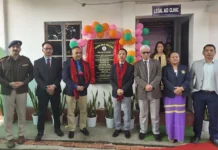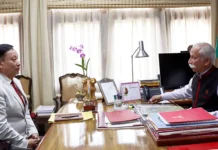[Tongam Rina]
The controversy surrounding the AE exam paper leakage refuses to die down since the leakage was reported on 29 August by one of the candidates. The latest leakage has further eroded the reputation of the Arunachal Pradesh Public Service Commission (APPSC), which has always managed to be in the news for all the wrong reasons. While it was on a path of course correction by conducting and declaring the results of exams on a regular basis, and was even praised recently, the paper leakage happened.
The unfortunate and unacceptable incident has shaken the society’s faith in the commission and questions are being raised with respect to the efficiency and integrity of the officials, the staff, and the members of the commission.
Following mounting pressure, APPSC chairman Nipo Nabam resigned, “owning moral responsibility for the omissions and commissions of the officer of the commission” who was responsible for ensuring secrecy and prevention of leakage of question papers.
In his resignation letter, he added that, “as per the manual for the Arunachal Pradesh Public Service Commission Conduct of Examination Guidelines, 2017, the standard operating procedure for ensuring secrecy and prevention of leakage of question papers till they are handed over to the examinees is the domain of the controller/deputy/assistant controller of examination, and as such the chairman or the members of the commission have no direct handling role.”
An unscrupulous officer of the commission does not define the commission as a whole.
With his resignation – though late but a dignified thing to do as the head of the commission – and the ongoing SIC investigation, till the CBI takes a call on whether to investigate the case, the rest of the commission should be allowed to function. In almost two months, the commission has not been able to resume its normal work.
There is a demand for overhauling the commission, but overhauling will not happen overnight. Even though the SIC investigation seems to be going steady and the committee constituted by the state on the paper leakage case has submitted its report, one has to remain practical, because something as big as a public service commission can’t be overhauled in a matter of few weeks or months.
Even though the four commission members and other employees are not the subject of an SIC or any other investigation, there is a demand that they resign. In a press conference, the chief minister was heard saying that the cabinet would pass a resolution on removal of the members and send it to the governor for approval. Easier said than done.
According to Article 317 (1) of the APPSC, the “chairman or member can only be removed by an order of the president on the ground of ‘misbehaviour’ after the president makes a reference to the Supreme Court and the Supreme Court, after an inquiry conducted according to Article 145, has reported that there should be removal.”
Further, under Article 317 (2), it is only when a reference is pending before the Supreme Court that the governor can order the suspension of the chairman or a member of the commission.
The very purpose of Article 317 is to insulate the commission from undue political influence, pressure, or control.
Therefore, the constitutional scheme is very clear that neither the state cabinet nor the union cabinet can pass any resolution for the removal or suspension of any member or chairman.
The role of a member of the APPSC is advisory in nature and is not part of the day-to-day functioning of the commission.
While a system is being put in place, now the step forward should be change in the APPSC Service Regulation Act, 1988, which the government has already announced. If the government is actually serious about its commitment to overhaul the system, the APPSC cadre should be merged with the state secretariat, as announced, and action should be taken against the APPSC officers, especially the officers who were primarily in the recruitment branch.
It should also initiate the process of appointing a new chairperson to facilitate the functioning of the commission with immediate effect.
It is also time to reprocess all the examinations, enabling the aspirants to their rightful service to employment on the basis of fair, impartial and meritocracy, upholding the provisions of the Constitution, as delay or a non-functional commission will impact on the opportunities of these young aspirants.
Now the focus should be on the investigation unearthing the real culprit, rather than asking for resignation of the APPSC members, who themselves are volunteering for free and fair CBI investigation or any other form of inquiry.
The issue here is to have a CBI investigation, not the resignation or suspension of the APPSC members, which, if actually done, will lead to the defeat of the government’s stand against corruption and thereby fail in unearthing the truth. Has the government heard from the CBI, or has it made public the findings of the government-appointed committee on the AE exam fiasco?
As per the APPSC Conduct of Examination Guidelines 2022, the members of the APPSC are not even remotely close to the examination process. Is the government trying to hide its own failings by sacrificing these members and employees of the commission who have been subjected to very intimidating and provocative press statements from various organisations?
Also, it is important to note that the commission has already initiated disciplinary proceedings against Taket Jerang, former deputy secretary-cum-deputy controller of examination. Even though the inquiry is still inconclusive as his production to the commission couldn’t be made as he was still in police/SIC remand, he has been sent on retirement. There have been demands for his termination from the job, but he can’t be terminated unless due process of law is followed. Under the proviso of Article 311 (2): “No civil servant can be dismissed or removed or reduced in rank except after an inquiry in which he has been informed of the charges and given reasonable opportunity of being heard in respect of those charges.”
It is worthwhile to remember that the commission is yet to get a chance to hear from Jerang as part of the inquiry process. One has to wonder whether Jerang has powerful names to reveal and the police have powerful individuals to protect by not allowing him to personally face the inquiry by the APPSC members.




